Killing trout is easy. The actual act, at least. I use a four-inch Mora knife for all my trout work, and even its light birch handle has plenty of heft for the job. For a hand-span length trout, one or two sharp raps above the eyes triggers that electric death-shudder, the final sparks of current, and the trout is perfectly limp in hand for the rest of the cleaning process. No twitches, no gill movement, nothing. If I’m lucky there’s some wild mint along the streambank to wrap the fish in before sliding it into my creel.
But then the killing of trout is not easy. It’s a troubling contradiction. To admire the dark gold flanks of a brown trout just moments from its undercut home, with flashes of blue and pearl on its gills and the starscape of black and red spots, unique to that fish alone, never before so arranged and never again to appear — it’s hard to take all that in and then whack it with the handle of a knife. Especially after a few decades in the fly fishing world.
As a kid, I was taught that fishing is a search for “keepers.” But upon buying my first fly rod at the smartass age of sixteen, I sought out other ideas. I traded traditional hook and bullet rags for fly fishing magazines, which included no photos of dead fish and no trout recipes. Through the transition from tackle box to fly vest, I omitted the old J. Marttiini Rapala filet knife as finally as a mayfly leaves behind its nymphal shuck. I had evolved beyond it. Keep ‘em wet, I cried, pinching down all my barbs, pretending I didn’t notice the arterial blood or torn mandibles of badly-hooked fish that I insisted upon releasing.
There is perhaps no more delusional angler on the water than the one who catches and releases a hundred trout in a weekend, admonishes a worm-dunker for keeping five, and then pats himself on the back for being a good conservationist. I’ve been that guy.
I’m a hunter. I grew up on venison and have killed my own since I was old enough to do so. It’s a lifestyle that’s questioned a lot these days, and the most thoughtful dialogue on the topic is led by modern conservationist-hunter-thinkers like Steven Rinella, Hank Shaw, and others. Their work focuses on the basic why of hunting: the ethical acquisition of high-quality meat.
The concept is not new, and those guys will tell you that. It is older than humankind. So old, and so deep, in fact, that my hunting elders never really spoke of it. They grew up during the depression on the edge of the great boreal forest, and talking about meat being the reason for hunting would be like talking about oxygen being reason for breathing.
More Like This
But today the world is a different place entirely and we must now talk about why we personally choose to kill animals. And think about it on our own. Challenge ourselves. And when we do, we find that it dovetails well with ongoing narratives about sustainable agriculture, landscape ecology, human health, and food ethics. Or it should.
And it’s within this discussion that catch-and-release fishing begins to lose its self-righteous shine. Conservation writer Todd Tanner says in his tense Seeking Absolution that the whole idea of catch and release “looks awfully tenuous, as if we are a legion of cats playing with a similar number of unhappy mice.” Even if catch and release was always harmless to the fish — which it is definitely not — it’s still questionable.
“At the same time, though,” Tanner adds, “I think it’s important to point out that we are cats.” We are meat-eaters, and fish are made of meat. By definition, catch and release is us playing with our food.
And fish are good food. No, not the grocery store’s dry-skinned bug-eyed farm-plumped rainbow trout, or the translucent, tasteless tilapia fillets, or the ethically-risky origin-unknown salmon. Instead consider these eight-to-ten-inch wild brown trout, lean and cold, delicious and nutritious, legally and ecologically sustainable. More than sustainable. On some streams, taking a few home is arguably ecologically beneficial.
On some streams, of course. It’s probably too obvious to mention, but not all fisheries can sustain catch-and-keep and not every angler can keep every fish they catch. Moderation in all things.
Because while food is the point, it’s not necessary to fill the freezer. To me, the act of converting fish to food strengthens my connection to the streams that I love, to my own past, to my reasons for fishing in the first place. It takes the experience beyond the technical challenge, the artistry of the cast and the flies. The blood on my hands reminds me of what’s really at stake out there. It’s never a game for the fish, even if I let them go.
So I take my little Mora knife with me on most Driftless trips these days. Bigger fish would probably require a harder hit and a bigger knife, but I don’t kill the bigger fish. I release them. I draw the line at one hand-span, one and a half years of growth. Bigger and smaller I release. I still release many more fish than I kill.
The line is arbitrary, gray. I know it. For now, I’m just trying to own the contradiction.





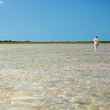

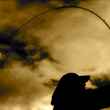
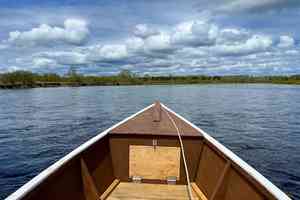


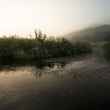
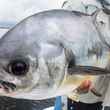
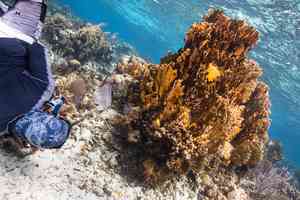


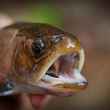
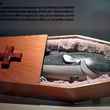




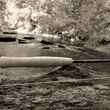



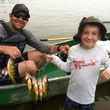
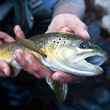
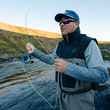
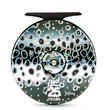
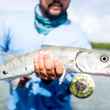
Comments
Dave replied on Permalink
Good read. I fish with a group of 10-15 guys year in and year out and admittedly none of us are hunters. But I don’t know any fly fishermen who look down on those who don’t catch and release. I think the feeling is that these fish populations are under a lot of pressure, so better to let the fish live to reproduce. But more knowledge into why (and, more importantly, when) catch and release is harmful would help. In the absence of that knowledge, the safe bet always feels like release, so we will always default to that.
Mark Kennedy replied on Permalink
You've got it. The writer of the article, not so much. Release them all... enough will die anyway; poor handling, winter kill, getting through the spawn, etc. The knife handle may work better on the writer's head/knuckles.... the pressure on the resource is so high anymore, the knife should be saved for cutting open food wrappers or for a rattlesnake bite.... or, use that knife handle on that bad snake.
Jeff replied on Permalink
So you are against keeping trout to eat, but favor killing "bad" snakes? What makes a snake "bad"? Why not keep some that you know are likely to die? Why do you feel the need to condemn others, like the author? Seems you need to contemplate your stances and make them more consistent.
Jim Brown replied on Permalink
I have to backpack into where I go fly-fishing. I take a box of rice, a lemon, an onion and a bit of foil. I catch enough for dinner or I eat rice. It's a good incentive to improve my skills. There's no need to take more than I can eat.
tony cave replied on Permalink
I hike camp and fly fish in a remote area of NW Scotland for trips of several weeks duration.I mainly C&R but do keep a few to eat.
I take fish that are injured by taking the fly deep or otherwise take pan sized fish from lochs with a good population
Phil replied on Permalink
Where I fish there are a lot of fisherman we release them so there will be something to catch next week. But we can keep two under 15 inches if we choose. I blog on several things and fly fishing on occasion. flipslife.com
Stumpy replied on Permalink
Good article. For these reasons, I don't really fish for trout too much; smallmouth are sturdier, and more plentiful where I fish. I really enjoy meat fishing on the great lakes with heavy trolling tackle and filling the icebox with fillets for the summer, but it's a completely different pursuit than stream fishing with light tackle. Both connect people to the water and animals and land, and serve good purposes.
I ate an undersized brook trout that I accidentally killed with a treble hook lure; poached him (literally and figuratively) in a pot of chicken soup. Seemed silly and wasteful to put him back in the water.
GV replied on Permalink
You used a treble hook and conveniently had to kill the fish. Treble hooks are not for catch and release and any sportsman worth their salt knows that. Nice job…
Terry Ferguson replied on Permalink
The verdict is out for me on treble hooks. I caught many browns with treble hooked lures in a past life. They can be pretty ugly to the mouths of these fish (14 to 24 inches). I switched to single hooks and found that the fish swallowed them much deeper resulting in mortally injuries much more frequently. Went back to trebles and killed less fish.
James Gibson replied on Permalink
Why do I fish??? I have no answer other than I jus love it and have since age 4. The instant a fish hits, the focus of the entire universe is on that one event, no matter what else is going on around you. Nuclear attacks would be put aside for that moment while you react to this rush of adrenaline and whatever other brainstem-level things surge through your entire being. God has met you with all his glory and all his mystery and all the surprise that transforms you from 21st century modern product of our advanced civilization to the most basic, elemental predatory reactor and grabber of prey which will feed you for another day! What a high! What a surge! What joy fills What an awesome accomplishment--I get my hands on this bite of food that forever gets away till now and now I got him!
All this emotion in a hundredth of a second! All for a 4 inch bluegill!
Anonymous replied on Permalink
It is fine to catch and release if your not hungry just don't take more than you will need to feed for your meal.
Robert Harrington replied on Permalink
Great, thoughtful article. I too have been that guy cruising the streams with a #2 mepps treble hook, cursing live-bait fisherman. I don't kid myself anymore, and if I think there's a chance the fish won't make it, that's my dinner. I wish more fishermen/women carried the awareness you point to in your article with them while going after fish.
Jack replied on Permalink
Thank you for the well written article. I have thought about these issues as well. Could you please address proper handling of the trout immediately after you kill it? Do you put it directly in the creel or do you bleed the fish first?
Tom H. replied on Permalink
Hey Jack, thanks. I gut the fish immediately after killing it. Cut from vent to gills, cut tongue free, pull on tongue and all entrails come out. Scrape kidney from backbone with thumb, rinse well, wrap in wet grass (or mint if handy) and place in creel.
Our creeks here are cold enough that occasionally dunking the creel to rewet everything keeps the fish cool until I get back to the truck, where a cooler with ice awaits.
Pgrass replied on Permalink
Perfectly written. 100 percent agree
Anonymous replied on Permalink
Very well put. There is fault and contradiction on both sides of the argument and this article addresses it all exceptionally. I mostly catch and release these days as I have enough food at home and the best lakes are usually restricted to the practice and other gear restrictions, but I still like to haul in a nice big salmon for the smoker too. Being honest with ourselves and fellow fisher-people is a big step forward.
Fitzerman replied on Permalink
I totally agree. I'm neither a purist of both extremes. Some days I release all, some days keep a few. Once in a blue moon take my limit. And yes release isn't always painless for the fish.
Taylor replied on Permalink
First of all, catch and release fishing is a practice that should be done by all fishermen. Have any of you noticed that the quality of fishing goes down gradually year by year? This is mostly due to habitat loss. Our streams and rivers can simply not support as many fish as they could 30 years ago. So we have less fish than before and now people who claim they love fishing want nothing to do with conserving it. Now I do not think that keeping a few trout after a day of fishing is immoral at all. However, 9 out of 10 of you reading this right now do the same thing every time you go fishing: Harvest a bunch of fish, clean them, bag them and throw them into an overflowing freezer where you will discover them 7 months later with freezer burn. Now those same fish that you took life from so they can sit in your freezer could have stayed in the river and reproduced. Its a simple concept.
Secondly, catch and release is rarely life-threatening for the fish. Yeah there is a hiccup every once in a while but hey, if you gut hook a trout you can keep him and add him to your freezer collection. Let everything else go. I have caught thousands of fish in my lifetime and never kept one. But I have caught fish with bite marks in the side, fish with paracites, fish with luers stuck in their throat, and even seen fish with claw marks on their back from escaping a bird of prey. My point is that if a trout can live after being dropped by a bird then I can gaurentee you that a trout can live after being hooked and released.
Paul replied on Permalink
SPOT ON! Well said and very poignant. The human species by it's very nature is a very greedy lot. Most of the harvester by their very human nature tend to have that character flaw. Please if you decide to kill a fish...eat it!
Al replied on Permalink
I spent a great deal of time on the water with my grandfather growing up. He had passed his farm to my uncle by the time I can remember and spent his time on the lake. Nearly every day June to Sept. he released a lot but would keep a few fish every trip out. All sorts of species, whatever we felt like going after. We'd eat some that day and the rest would go in the freezer. In September he'd have a fish fry at the cottage, extended family, friends, neighbors. Was great. The family still has it, 20 years since he passed... may not
Sound it but he was a conservationist along the lines of your article. He taught us to put the big and small back, keep some of the medium sized and the ones we hurt. And so we understood there was a purpose for fishing. I think when you understand that purpose it gives you a stronger drive for protecting and conserving the resources. I started spending a lot of time on the water with my son this year. He's 4. He'd like to keep everything he catches but he knows that we put most back and a few in the bucket. If we hurt the fish he goes in the bucket. There is something really special in the pride on the face of a 4 year old running his bucket up to show his mama the fish he got for supper. My grandfather understood that too and in those moments now I can almost hear him chuckling to himself the way he did years ago when we kids would jump out of the boat and run up ahead of him with our bucket years ago.
Devin replied on Permalink
I think most are missing the main point here. This is not a debate between keeping fish or releasing them, but an important examination of the morality of catch and release fishing. Glad to see this line of thinking coming from the fly fishing community. I've long been perplexed by the blind spot for the problems inherent to catch and release fishing and the mortality rates associated with it. If you've got enough food maybe, instead of poking holes in a few more lips, you shouldn't be fishing at all.
Blair replied on Permalink
From a very young age I hunted 'pest' animals such as possums, and later, game animals and birds. In New Zealand all the animals and birds I've hunted are introduced, and numbers of larger game animals like thar and deer absolutely need control to protect both them and the environment from overpopulation. I have occasionally let deer walk away, for various reasons. I only take what I am going to use. I also find the debate over killing animals very challenging, but I'm comfortable with the decisions I make to take or to leave.
New Zealand trout also are introduced. This aspect to our trout population management is very important. I think it differentiates between the need for the protection of a native population for ecological reasons, and the need to maintain a healthy population of imports for the enjoyment of other anglers.
Here in New Zealand we have recently been unfortuanately encumbered with an proportionally large and rapid growth in nett migration, which is now challenging us in almost all facets of our lives, including trout fishing. Not just because more trout are being caught. More and more of our waterways are becoming more and more polluted, and more and more pressure is being put on water as a resource that industry somehow sees as 'theirs' to do with whatever they want. Incredibly, there are even people here who hold the view that 'fresh' water running out a river mouth into the sea without having been 'used' somehow, is 'wasted'!
My choice to put trout back is weighted largely by the requirement that if I take food home to my family it must be healthy. So while I might take a trout from one of our remaining unspoilt waterways, I do not take them from lowland river areas such the lower Tukituki and Ngaruroro rivers. I may also leave trout from clean upland waterways where populations are very low - but that is in the spirit of sharing the resource with fellow anglers.
Ultimately, there is also an expectation that the managers of our trout populations should put our license fees to good use and maintain appropriate fish numbers but apart from these funds being diverted into habitat protection (no point releasing trout into polluted water), another unfortunately another aspect to NZ's game management is that (unless it's changed) our Fish and Game organisation is not allowed to release fish into Conservation areas (virtually all our public forest/ bush areas). So a number of upland rivers hold only relatively low numbers of trout.
For all these reasons I release most of the trout I catch, and I treat them as carefully as I can during capture (landing, crushed barbs, wet hands, no pressure on heart area when handling etc) to ensure they have the best chance of survival.
toma replied on Permalink
Great article. We have a ranch in central Wyoming with a brookie stream running through it. I have found dead fish along the banks with ripped lips or gills torn from catch and release. I do not think I find most of them as the coyote, eagles, blue herons, and other predators eat them. Catch and release is not harmless like you say in article. I think it is great we are having this discussion as 40 years ago none of us ever thought about releasing them, now people get squeamish about keeping even the hurt fish. I think the fisherman needs to have some knowledge about the water he is fishing, if lots of pressure and no fish they should probably release the uninjured fish, if no pressure and lots of fish keep what you are comfortable with. Make you mind up before you go, think about what you are doing.
Zoan Kulonski replied on Permalink
It seems to me that the fish you are finding with torn lips and gills are from spin fishermen. Treble hooks greatly damage fish and should NEVER be used for C&R
Anonymous replied on Permalink
I love to eat trout and I love catching them even more. Some days, I may catch dozens and other times only one or two or even zero. For me, one or two isn’t enough to keep as that wouldn’t be enough to serve my family for dinner. Problem is... after catching that first or second fish, I don’t know how many more I’ll get that day, if any. Therefore, I’ve decided to only catch and release because I would hate to waste ANY of these creatures.
More importantly, I would love you to expand on the idea of ‘bending back’ the barbs on your hooks. I’d love to see a law that only allows for barbless hooks while fishing for trout. It’s my opinion that most anglers do not have the skill to successfully unhook a trout without seriously injuring it- with a barbed hook.
Mike replied on Permalink
Where I live, a lot of the lakes and rivers are full of stunted trout because the numbers are too large for the available food supply. There fore it is actually a good thing to keep some for the pan as long as it is not excessive. I only keep enough for a meal for two...fresh is always best! I see nothing wrong with this.
Jons replied on Permalink
Well done, thank you, and agreed. Meat is murder, but we evolved to be good at it. Taking it on open-eyed so that it prompts the very self-reflection and ambiguity this piece conjures seems the only way to responsibly own it.
Rich Kelly replied on Permalink
It's a well written article, though the praise stops there. Maybe you are enlightened, intelligent, and knowledgeable, enough so that you can make correct decisions about how many and what size trout it is acceptable to kill from each watershed without harming the resource. Maybe you're not. The fear is, that many others are emphatically not, and their numbers are legion. Keep the conversation to no kill, catch and release, and one does the most good to protect the resource. Some released fish unfortunately die, all creeled fish unsurprisingly die. One would do well in preserving our passion and sport to focus on educating others on improved fish handling practices rather than opining on the quality of wild trout as table fare. I do not look down upon keepers of trout, whether they be wild or stocked, I view these poor people with extreme pity because if those individuals cannot recognize that needlessly eliminating such beauty from this world is a furtherance of its ever growing ugliness, what hope is there for them? Or else they are starving. If you are starving and the only option is a trout, there is something to be said for survival and I won't begrudge a human that. I'm writing this as a man that has had the pleasure of making the acquaintance of a number of trout, some wild; by choice I have only eaten only grocery store trout, and I've never suffered from a nutritional deficiency. Grocery store trout couldn't be that lacking. The beautiful trout in streams are a precious resource that is not easily replaced, the already dead ugly ones at the grocery store get shipped in almost daily. If you want to keep a trout, and its legal to do so, I can't say much about that other than that I expected more from my fellow man or woman. If for whatever reason you cannot adequately appreciate and respect beauty and must remove it from the world maybe, just maybe, in the interest of others and the sport, or if it connects with you better, for your own self-interest, keep your trout quietly and otherwise make public statements to protect the resource.
Bob Bluhm replied on Permalink
Good article and I've been reconsidering my approach to catch and release these days.
I am as uncomfortable with killing a trout as catching and releasing an injured one. I've reconciled to catch only one, release it and glory in that event. But I understand in the these days of put and catch that most of the fish we raise in hatcheries will end up dying because of the environmental degregation whether via climate change or the poisoning of the steams we fish. So, I am at peace with the harvesting of those fish which are destined to die through no fault of their own, but disagree with those who insist on 'limiting out' just to fill their freezers.
Larry Rand replied on Permalink
I've felt that much of the momentum for catch and release was supplied by manufacturers and dealers who saw a way to keep people fishing longer--and consuming more goods--with no regard for catch limits. If catch and release fans were saying "stop fishing when you've limited out," I'd be more impressed, but I routinely read how someone caught 45 bass in one outing--allegedly okay because none were kept. Catch and release is stressing out animals for sport, a concept I find hard to justify. I do release trophy fish and undersized fish (I catch a LOT more of the latter), but I love to eat fish and keep some for that purpose. Humans, like all animals, devour other living things to stay alive. I agree that some fish populations in certain bodies of water are unable to bear much fishing pressure and need to be restricted to catch and release. I'm okay with that--but I don't fish there.
Chase T replied on Permalink
I would like to hear more about why you choose to keep only medium sized, but always release the large ones
Bill Crumrine replied on Permalink
Being an outdoor writer with membership in both the Outdoor Writers Association of America and the Texas Outdoor Writers Association, I have written about this catch n' release versus catch n' keep on several occasions. All regarding bass and trout. Yes, I do keep bass and have eaten two seven pounders and God only know how many weighing from two-to-six pounders.
To me this catch n' release has become a philosophical/religious entity in itself. It has been said by both professional bass anglers and local associates that eating a bass ranges from eating your pet dog to having sexual relations with your sister. Barbara Streisand as Rush Limbaugh says in using her name to equate to what the bull does in the field or his pen. While about three or four have had a bad taste, the vast majority have been great. I have even had fellow co-workers ask if I have bass left-over for lunch they have been so good.
I have seen and heard about some private land-owners who insist on catch n' release, only to see their bass fishery decline to such a point that they have needed to start over and believe me it costs. Now do I keep all the bass I catch, absolutely not!!! I limit myself to three bass per trip and once again I use the phrase God only knows if I am that lucky to catch three. It is the way nature works.
Now I live in Alaska during the summers and yes, I practice catch n' release where required. It is the law. However, I know of certain places where catch n' keep is encouraged.
Is it a crime or sin to keep and eat bass or trout - absolutely not. Where allowed do so if you wish.
Kid replied on Permalink
Might want to make sure your one hand span rule aligns with the actual regulations for the streams you are fishing.
Kimball Leighton replied on Permalink
A thoughtful piece that plays right into the hands of fisheries managers here in Montana who lately assert that killing more river trout, especially large ones, will increase numbers of trout -- quality vs. quantity. Montana's rivers are all populated by wild fish; river stocking stopped here in 1974. It's the same fisheries managers who are killing entire streams to rid them of non-native brown, brook and rainbow trout for the perpetuation of native cutthroat trout. In the first case, fisheries managers are shirking their responsibility to regulate fishing pressure on the state's blue-ribbon rivers and hoping that anglers will do the job and settle for less in the bargain. In the second case, many here argue that "a trout is a trout" and oppose the cutthroat-only genocide for a species that is bound to be out-competed again. As to stocked trout, the author's argument is perfectly valid.
Andrew Wesner replied on Permalink
Many years ago John Shewey wrote an article about “Touch and Go” angling. Essentially this was dry fly fishing with a fly that had no hook. Good read as it relates to fishing ethics. I’ve been advocating catch and release limits for years. I think it’s good policy. If you can keep two on a stream, maybe a release limit of 5? I think it would focus people away from bobber/nymph dragging in a drift boat and get them more engaged in looking for a fish to fish to. I’ve learned more from getting skunked than the days I can’t keep them off the line…
Kerry replied on Permalink
The only trout I have deliberately killed for food were the little brookies our family caught while camping beside a stream in North Park Colorado. The upstream section held an incredible population of very small brookies, while further downstream respectable sized browns and rainbows thrived. I always felt that the upstream brookies were of such sufficient number that killing just a few for breakfast would not endanger the sustainability of the population. Our summer trips there were the classroom of fly fishing for my young sons, and eating those fish was a reminder of the nature of the passion we all shared.
Pages